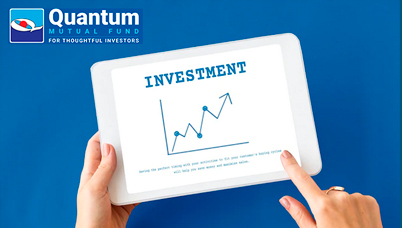An Easy Way to Assess Your Risk Profile
Posted On Wednesday, Aug 19, 2020
Some of the most popular questions asked by our investors especially during the current crisis are -
"Should I continue my SIP in Equity funds?"
"Should I invest in Debt funds rather than a Bank FD?"
"Can Gold save me from the current crisis?"
"Are Hybrid Funds good for long term investments?"
These questions are valid.
We have always answered them in one way or another.
But what really determines your portfolio "well-being?"
Your Risk bearing capacity. Your Risk Appetite....
In times of economic uncertainty, it's important to re-strategize your investment portfolio.
Since almost everything around us has changed.
It makes total sense to re-evaluate your risk appetite. Not just to ensure there is no further damage to your investment portfolio, but also to make the most of the hidden opportunities amidst turmoil.
A risk profile is important for determining a proper asset allocation for your investment portfolio.
In this article we aim to help you understand your attitude towards risk, and how your tolerance to risk translates into your portfolio construction.
You see, every asset class has a risk-return trait suitable for a certain level of personal risk appetite, investment objectives, financial goals, and the time horizon to achieve them.
Let us look at 9 factors that determine Asset Allocation by Risk Profile -
1. Your age
Have your heard of the 100 rule?
It's by far the easiest and most interesting way to determine risk by your age.
It simply states that you should take the number 100 and subtract your age. The result should be the percentage of your portfolio that you dedicate to equity mutual funds.
If you're 25, this rule suggests you should invest 75% of your money in equity mutual funds. And if you're 75, you should invest 25% in equity mutual funds.
In other words the basic principle behind age-based asset allocation is that your exposure to portfolio risk needs to reduce with age.
2. Your annual income
Given the expenses, the higher the income, the higher could be your risk appetite.
Of course things might have changed now a little bit, that's why, dear investor, re-evaluating risk becomes more important.
3. Your existing assets
Are you a young investor starting your wealth creation journey?
Or Are you a seasoned investor with high-value assets and well-diversified.
This will determine a lot on your risk bearing capacity.
4. Current financial liabilities
As said above, let's assume you are a seasoned investor or a high income individual.
Your risk appetite could be low if your current liabilities are high.
Also if your income is low but with no current liabilities you are free to take more risk.
5. Your knowledge of financial markets
This could be your game changer!
If you know well enough about the financial markets, you can aim for prudent asset allocation.
For instance, this can help you understand that equities are very risky if you are investing for a short tenure; but the same equities could offer a very attractive risk adjusted return when you are holding for a long period of time.
Thus increasing your chance to make the most out of your portfolio. Eventually earning higher risk adjusted returns.
6. Monthly investible surplus
No matter if you fall under the high income bracket or not. Monthly investible surplus depends upon your financial responsibilities.
So, once all your monthly expenses are taken care of. You have paid your monthly EMIs, bills, SIPs etc.
Is there any surplus amount left for you to further invest?
If your proportion of investible surplus is high, your risk-taking ability could also be high.
7. Investment time horizon
This is very common.
We have several times discussed this when it comes to long term investment in equity mutual funds.
The longer time horizon for investment, the greater risk-taking capacity.
If you need your money in short period of time, you are not recommended to take undue risk with your money.
8. Broader investment objective of the investor
If your investment objective is capital appreciation over a long period of time, usually the propensity to take on risk is usually higher.
You are one of those investors who seek a significant level of returns.
These investors could take on higher risk over a long period. More aggressive strategies that may offer higher potential risk adjusted long term returns.
9. Degree of loss the investor can endure
"If you are not willing to risk the unusual, you will have to settle for the ordinary - Jim Rohn"
Last but not the least, if you are one of those who believe taking risk to achieve the extraordinary is the way to go, you have a high risk appetite.
Higher the degree of loss you can bear, higher is the risk endurance.
The Bottom Line
Yes, all investors are not the same.
Some prefer less risk. While some might prefer higher risk than even the higher net worth individuals.
It is important for you to understand the idea of risk and how it applies to YOUR investment portfolio.
Thus helping you make an informed investment decision.
Let us make it easy for you. Try your personal asset allocator to check your risk profile NOW. Just click here.
Editor's Note: Want to know more about why understanding your risk profile is important for your overall portfolio. Write to us at [email protected] Or give us a missed call at +91-22-68293807 and we will call you back.
Disclaimer, Statutory Details & Risk Factors:
The views expressed here in this article / video are for general information and reading purpose only and do not constitute any guidelines and recommendations on any course of action to be followed by the reader. Quantum AMC / Quantum Mutual Fund is not guaranteeing / offering / communicating any indicative yield on investments made in the scheme(s). The views are not meant to serve as a professional guide / investment advice / intended to be an offer or solicitation for the purchase or sale of any financial product or instrument or mutual fund units for the reader. The article has been prepared on the basis of publicly available information, internally developed data and other sources believed to be reliable. Whilst no action has been solicited based upon the information provided herein, due care has been taken to ensure that the facts are accurate and views given are fair and reasonable as on date. Readers of this article should rely on information/data arising out of their own investigations and advised to seek independent professional advice and arrive at an informed decision before making any investments.
Mutual fund investments are subject to market risks read all scheme related documents carefully.
Please visit – www.QuantumMF.com to read scheme specific risk factors. Investors in the Scheme(s) are not being offered a guaranteed or assured rate of return and there can be no assurance that the schemes objective will be achieved and the NAV of the scheme(s) may go up and down depending upon the factors and forces affecting securities market. Investment in mutual fund units involves investment risk such as trading volumes, settlement risk, liquidity risk, default risk including possible loss of capital. Past performance of the sponsor / AMC / Mutual Fund does not indicate the future performance of the Scheme(s). Statutory Details: Quantum Mutual Fund (the Fund) has been constituted as a Trust under the Indian Trusts Act, 1882. Sponsor: Quantum Advisors Private Limited. (liability of Sponsor limited to Rs. 1,00,000/-) Trustee: Quantum Trustee Company Private Limited. Investment Manager: Quantum Asset Management Company Private Limited. The Sponsor, Trustee and Investment Manager are incorporated under the Companies Act, 1956.
Related Posts
-

Invest without Stress - With Quantum Mutual Fund!
Posted On Monday, May 09, 2022
Since inception, Quantum AMC has stayed true to its Vision and Mission.
Read More -

Active or Passive Investing: Which Style is Right for You?
Posted On Tuesday, Apr 26, 2022
With such a wide variety of investment avenues and styles, you may be confused as to which is the best for you.
Read More -

Stay Ahead of Inflation During These Uncertain Times
Posted On Wednesday, Apr 13, 2022
Inflation has been slowly but steadily eating into the savings of investors.
Read More



